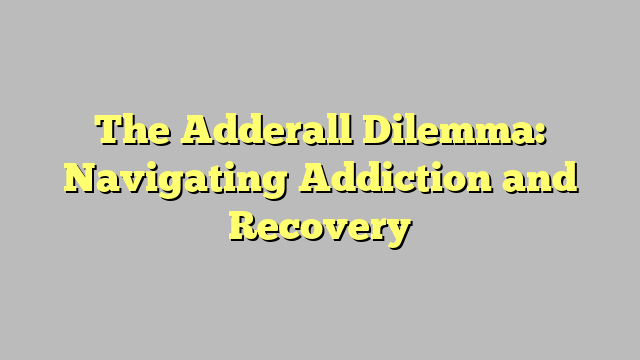
The Adderall Dilemma: Navigating Addiction and Recovery
- by Jose Bryant
In today’s fast-paced world, the use of Adderall has become increasingly prevalent among individuals seeking enhanced focus and productivity. However, with its potential for abuse and addiction, the Adderall dilemma poses a significant challenge for many. Those who fall into the trap of Adderall addiction can find themselves caught in a cycle of dependence that can have detrimental effects on their physical, mental, and emotional well-being. It is essential to understand the complexities of Adderall addiction and to navigate the path to recovery with compassion and support.
Effects of Adderall
Adderall is a powerful stimulant that affects the central nervous system. When taken as prescribed, it can help individuals with attention-deficit hyperactivity disorder (ADHD) stay focused and alert. However, misuse or abuse of Adderall can lead to a range of negative effects on both the mind and body.
One of the immediate effects of Adderall is increased energy and enhanced focus. Users may feel more alert and able to concentrate for extended periods of time. This can be beneficial in certain situations, such as studying for exams or completing work assignments on a tight deadline.
Over time, prolonged use of Adderall can result in tolerance, where higher doses are needed to achieve the same effects. This can increase the risk of dependence and addiction. Additionally, misuse of Adderall can lead to side effects such as insomnia, anxiety, and even heart problems. It is important to use Adderall only as directed by a healthcare professional to minimize these risks.
Treatment Options
When it comes to addressing adderall addiction, seeking professional help is often essential. Treatment options may include therapy, such as cognitive-behavioral therapy, to explore the underlying causes of addiction and develop coping strategies.
Another approach to treating adderall addiction is through medication-assisted treatment, which involves using certain medications to manage withdrawal symptoms and reduce cravings. This approach can be effective in supporting individuals through the recovery process.
In addition to therapy and medication-assisted treatment, support groups and peer counseling can be valuable resources for those struggling with adderall addiction. Connecting with others who have faced similar challenges can provide a sense of community and understanding that is crucial for long-term recovery.
Prevention Strategies
Educating individuals on the potential risks associated with Adderall use is crucial in preventing addiction. Providing comprehensive information on the addictive nature of the drug and the negative repercussions of misuse can help individuals make informed decisions.
Encouraging healthy lifestyle habits, such as regular exercise and balanced nutrition, can significantly lower the likelihood of developing an Adderall addiction. Engaging in activities that promote overall well-being can serve as a positive outlet and reduce the desire to rely on stimulant medications.
Is Adderall Addictive
Establishing a support system and open lines of communication can also aid in preventing Adderall addiction. Encouraging individuals to seek help when struggling with stress, academic pressures, or mental health issues can prevent the misuse of Adderall as a coping mechanism.
In today’s fast-paced world, the use of Adderall has become increasingly prevalent among individuals seeking enhanced focus and productivity. However, with its potential for abuse and addiction, the Adderall dilemma poses a significant challenge for many. Those who fall into the trap of Adderall addiction can find themselves caught in a cycle of dependence that…